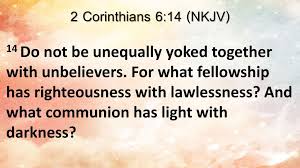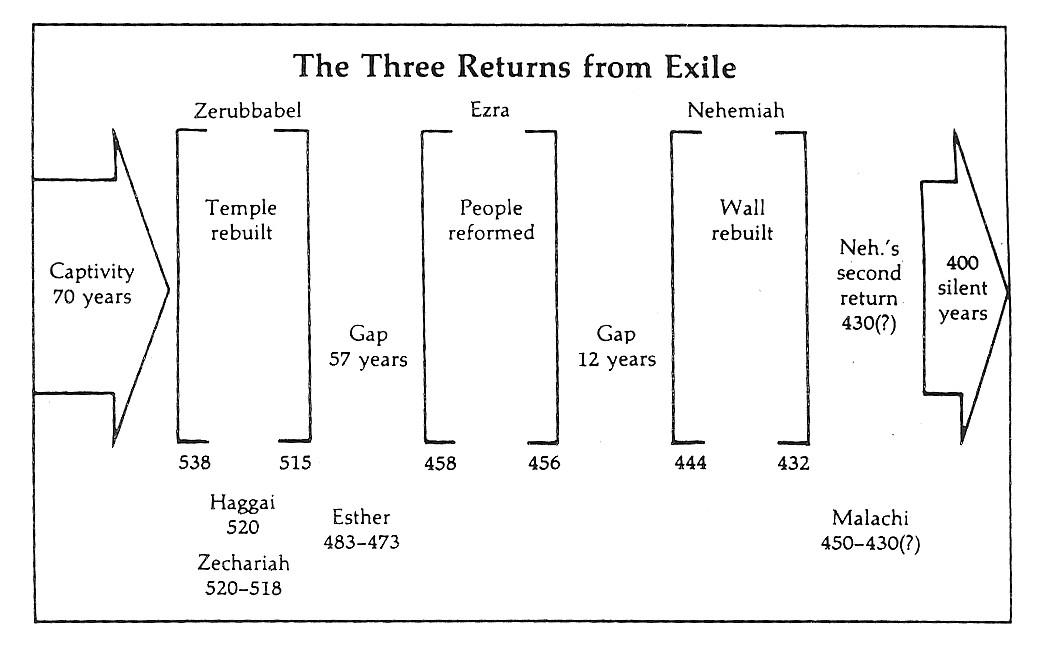
Mixed Marriage
A "mixed marriage" in the Bible is a marriage between a follower of Jesus and a non-believer.
After the destruction of the First Temple in Jerusalem in 586 BC, a remnant of Jews returned to Jerusalem after 70 years.
Denunciation of Mixed MarriagesAfter these things had been done, the officials approached me and said, ‘The people of Israel, the priests, and the Levites have not separated themselves from the peoples of the lands with their abominations, from the Canaanites, the Hittites, the Perizzites, the Jebusites, the Ammonites, the Moabites, the Egyptians, and the Amorites. For they have taken some of their daughters as wives for themselves and for their sons. Thus the holy seed has mixed itself with the peoples of the lands, and in this faithlessness the officials and leaders have led the way.’ When I heard this, I tore my garment and my mantle, and pulled hair from my head and beard, and sat appalled. Then all who trembled at the words of the God of Israel, because of the faithlessness of the returned exiles, gathered around me while I sat appalled until the evening sacrifice. Ezra’s PrayerAt the evening sacrifice I got up from my fasting, with my garments and my mantle torn, and fell on my knees, spread out my hands to the Lord my God, and said, ‘O my God, I am too ashamed and embarrassed to lift my face to you, my God, for our iniquities have risen higher than our heads, and our guilt has mounted up to the heavens. From the days of our ancestors to this day we have been deep in guilt, and for our iniquities we, our kings, and our priests have been handed over to the kings of the lands, to the sword, to captivity, to plundering, and to utter shame, as is now the case. But now for a brief moment favour has been shown by the Lord our God, who has left us a remnant, and given us a stake in his holy place, in order that he may brighten our eyes and grant us a little sustenance in our slavery. For we are slaves; yet our God has not forsaken us in our slavery, but has extended to us his steadfast love before the kings of Persia, to give us new life to set up the house of our God, to repair its ruins, and to give us a wall in Judea and Jerusalem. ‘And now, our God, what shall we say after this? For we have forsaken your commandments, which you commanded by your servants the prophets, saying, “The land that you are entering to possess is a land unclean with the pollutions of the peoples of the lands, with their abominations. They have filled it from end to end with their uncleanness. Therefore do not give your daughters to their sons, neither take their daughters for your sons, and never seek their peace or prosperity, so that you may be strong and eat the good of the land and leave it for an inheritance to your children for ever.” After all that has come upon us for our evil deeds and for our great guilt, seeing that you, our God, have punished us less than our iniquities deserved and have given us such a remnant as this, shall we break your commandments again and intermarry with the peoples who practice these abominations? Would you not be angry with us until you destroy us without remnant or survivor?O Lord, God of Israel, you are just, but we have escaped as a remnant, as is now the case. Here we are before you in our guilt, though no one can face you because of this.’ The People’s ResponseWhile Ezra prayed and made confession, weeping and throwing himself down before the house of God, a very great assembly of men, women, and children gathered to him out of Israel; the people also wept bitterly. Shecaniah son of Jehiel, of the descendants of Elam, addressed Ezra, saying, ‘We have broken faith with our God and have married foreign women from the peoples of the land, but even now there is hope for Israel in spite of this. So now let us make a covenant with our God to send away all these wives and their children, according to the counsel of my lord and of those who tremble at the commandment of our God; and let it be done according to the law. Take action, for it is your duty, and we are with you; be strong, and do it.’ Then Ezra stood up and made the leading priests, the Levites, and all Israel swear that they would do as had been said. So they swore. Foreign Wives and Their Children RejectedThen Ezra withdrew from before the house of God, and went to the chamber of Jehohanan son of Eliashib, where he spent the night. He did not eat bread or drink water, for he was mourning over the faithlessness of the exiles. They made a proclamation throughout Judah and Jerusalem to all the returned exiles that they should assemble at Jerusalem, and that if any did not come within three days, by order of the officials and the elders all their property should be forfeited, and they themselves banned from the congregation of the exiles. Then all the people of Judah and Benjamin assembled at Jerusalem within the three days; it was the ninth month, on the twentieth day of the month. All the people sat in the open square before the house of God, trembling because of this matter and because of the heavy rain. Then Ezra the priest stood up and said to them, ‘You have trespassed and married foreign women, and so increased the guilt of Israel. Now make confession to the Lord the God of your ancestors, and do his will; separate yourselves from the peoples of the land and from the foreign wives.’ Then all the assembly answered with a loud voice, ‘It is so; we must do as you have said. But the people are many, and it is a time of heavy rain; we cannot stand in the open. Nor is this a task for one day or for two, for many of us have transgressed in this matter. Let our officials represent the whole assembly, and let all in our towns who have taken foreign wives come at appointed times, and with them the elders and judges of every town, until the fierce wrath of our God on this account is averted from us.’ Only Jonathan son of Asahel and Jahzeiah son of Tikvah opposed this, and Meshullam and Shabbethai the Levites supported them. Then the returned exiles did so. Ezra the priest selected men, heads of families, according to their families, each of them designated by name. On the first day of the tenth month they sat down to examine the matter. By the first day of the first month they had come to the end of all the men who had married foreign women. There were found of the descendants of the priests who had married foreign women, of the descendants of Jeshua son of Jozadak and his brothers: Maaseiah, Eliezer, Jarib, and Gedaliah. They pledged themselves to send away their wives, and their guilt-offering was a ram of the flock for their guilt. Of the descendants of Immer: Hanani and Zebadiah. Of the descendants of Harim: Maaseiah, Elijah, Shemaiah, Jehiel, and Uzziah. Of the descendants of Pashhur: Elioenai, Maaseiah, Ishmael, Nethanel, Jozabad, and Elasah. Of the Levites: Jozabad, Shimei, Kelaiah (that is, Kelita), Pethahiah, Judah, and Eliezer. Of the singers: Eliashib. Of the gatekeepers: Shallum, Telem, and Uri. And of Israel: of the descendants of Parosh: Ramiah, Izziah, Malchijah, Mijamin, Eleazar, Hashabiah, and Benaiah. Of the descendants of Elam: Mattaniah, Zechariah, Jehiel, Abdi, Jeremoth, and Elijah. Of the descendants of Zattu: Elioenai, Eliashib, Mattaniah, Jeremoth, Zabad, and Aziza. Of the descendants of Bebai: Jehohanan, Hananiah, Zabbai, and Athlai. Of the descendants of Bani: Meshullam, Malluch, Adaiah, Jashub, Sheal, and Jeremoth. Of the descendants of Pahath-moab: Adna, Chelal, Benaiah, Maaseiah, Mattaniah, Bezalel, Binnui, and Manasseh. Of the descendants of Harim: Eliezer, Isshijah, Malchijah, Shemaiah, Shimeon,Benjamin, Malluch, and Shemariah. Of the descendants of Hashum: Mattenai, Mattattah, Zabad, Eliphelet, Jeremai, Manasseh, and Shimei. Of the descendants of Bani: Maadai, Amram, Uel, Benaiah, Bedeiah, Cheluhi,Vaniah, Meremoth, Eliashib, Mattaniah, Mattenai, and Jaasu. Of the descendants of Binnui: Shimei, Shelemiah, Nathan, Adaiah, Machnadebai, Shashai, Sharai, Azarel, Shelemiah, Shemariah, Shallum, Amariah, and Joseph. Of the descendants of Nebo: Jeiel, Mattithiah, Zabad, Zebina, Jaddai, Joel, and Benaiah. All these had married foreign women, and they sent them away with their children. (Ezra 9-10) Commentary on Ezra by Ray Stedman"The people of Israel and the priests and the Levites have not separated themselves from the peoples of the lands with their abominations, from the Canaanites, the Hittites, the Perizzites, the Jebusites, the Ammonites, the Moabites, the Egyptians, and the Amorites. For they have taken some of their daughters to be wives for themselves and for their sons; so that the holy race has mixed itself with the peoples of the lands. And in this faithlessness the hand of the officials and chief men has been foremost." (Ezra 9:1-2 RSV) What does this mean? They were simply starting the whole wretched mess all over again. This is what had broken the strength of the nation before. This is what had undermined the power of God among them and finally dispersed the people, broken up the tribes, and separated them into two nations. At last, as they had carried on this idolatrous practice, God had delivered them into the hands of their captors. Now, after seventy years, they hadn't learned a thing. The flesh never changes. No matter how long you walk in the Spirit, you will never get to the place where you cannot revert to the worst you ever were, if you depart from dependence upon the Spirit of God. They are right back to the same old ways. Ezra, in verse 3, says: When I heard this, I rent my garment and my mantle, and pulled hair from my head and beard, and sat appalled....until the evening sacrifice. (Ezra 9:3-4 RSV) It was unbelievable. As the book nears its close, Ezra prays to God and confesses this great sin. In his graciousness God moves in the hearts of the people. The leaders come in broken-hearted contrition to Ezra and acknowledge the wrong. A proclamation is issued. The people assemble together. It happens to be a day when it is raining, but despite the rain, the people stand, thousands of them in front of the temple, and confess their guilt -- the fact that they had disobeyed God -- and agree to put away the wives and children they had acquired outside the will of God. Now this is a hurtful thing, isn't it? It isn't easy. This is what Jesus meant when he said, "If any one comes to me...does not hate his own father and mother and wife and children...he cannot be my disciple." (Luke 14:26) Our relationship with God comes first. It doesn't mean that a man is to put away his wife today. This is a symbolic teaching. It means that we are to put away whatever stems from the flesh, which is always pictured by these Canaanite tribes in the land. But we love the flesh, don't we? We like to feel angry and resentful toward others. We love to nurse a grudge, cherish feelings of bitterness, or keep an unforgiving spirit burning away in our hearts against someone. We love it! We don't want to give it up! These things can cause physical ailments in us. Perhaps more than fifty percent of the nervous and physical problems that we suffer are due to wrong attitudes. But when someone points it out to us, we would rather go on having the problem than change the spirit or the attitude. It is hard, isn't it? It was hard for the Israelites to put away their wives and children, but they realized that the only chance of being restored to the place of fellowship with the living God and finding the power of God manifest once again among them, was to be obedient to his word. Jesus said, "If your right eye causes you to sin, pluck it out and throw it away...If your right hand causes you to sin, cut it off." (Matthew 5:29, 30) Be ruthless in these things. Put them away. As the book nears its close, Ezra prays to God and confesses their great sin. In his graciousness God moves in the hearts of the people. The leaders come in broken-hearted contrition to Ezra and acknowledge the wrong. A proclamation is issued. The Jesus meant when he said, "If any one comes to me and does not hate his own father and mother and wife and children...he causes you to sin, cut it off." (Matthew 5:29, 30) Be ruthless in these things. Put them away. |
 As we work together with him, we urge you also not to accept the grace of God in vain. For he says,| We have spoken frankly to you Corinthians; our heart is wide open to you. There is no restriction in our affections, but only in yours. In return—I speak as to children—open wide your hearts also. The Temple of the Living GodDo not be mismatched with unbelievers. For what partnership is there between righteousness and lawlessness? Or what fellowship is there between light and darkness? What agreement does Christ have with Beliar? Or what does a believer share with an unbeliever? What agreement has the temple of God with idols? For we are the temple of the living God; as God said,
...Now that is what I find is wrong in many, many places and among many individuals today. They are Christians, but their lives are cold and barren. They are lonely, oftentimes. They are bored; they find life hardly worth the living. They have to struggle to get up in the mornings, to make themselves go on. Why? Well, Paul puts his finger right on the problem. It is not that they are not being loved. There are people reaching out to them and trying to touch them and help them, but they are not responding, and love that is not reciprocated can go no further. To be loved is to be given an opportunity to step into a new and wonderful and greater experience of life; to be freed, in a sense. That is what love does. When you love a child you free him. He relaxes, he begins to feel himself. We have all felt this. So, to be loved is to be given an opportunity to step into freedom, if you respond. The fulfillment of that opportunity depends on you. You are given the opportunity by the one who loves you, but you lay hold of it by loving him back. That is why Paul pleads here with these Corinthians: "Oh! Corinthians, widen your hearts unto us. You are not restricted by us. You are restricted by yourselves, in your own affections. If you really want to experience the richness of love, then love back when you are loved." This is one of the most important lessons we can ever learn in life. Love must respond. When you are loved what do you do? Do you love back, or do you say, "Oh, what a wonderful feeling! I hope they will keep that up?" Do you expect it all to come to you without a reciprocal response from you? No, that is impossible. Love must respond. C. S. Lewis said a wonderful word, which is helpful at this point:
That, of course, is what keeps us from loving back. We are afraid we are going to risk something, and we do. He goes on:
That is why people who do not learn this great lesson, to love back when they are loved, live in a little hell of their own making. So Paul ends this with this loving, fatherly appeal: "In return -- I speak as to children -- widen your hearts also." If they begin to love back, that will enable them to share themselves, to open up, to communicate how they feel, to begin to respond with affection as well. They will begin to live. That is what Paul wants. I find that often in many congregations Christians are cold, frigid. They are tied up in themselves. They sit in services and do not even speak to people. Oftentimes this is encouraged as a kind of reverence, supposedly, but God is not interested in that. He is interested in people who are open and responsive to one another. This coldness is what turns young people off. They come to our services and they are so cold and formal, oftentimes, that they are not interested; they are repelled by that. When congregations learn to be open, responsive, warm, loving and reaching out, it is always exciting. Young people are attracted to that, and they will come. That is what the apostle is after here. It is a great feeling to be loved. We want it to increase, but we ought to understand that it cannot increase until we respond. Even God cannot love beyond what we let him love us. He loves us and he is constantly displaying that love in a thousand and one ways, but we do not feel that love until we respond to what we already have. That is what he says. Until we begin to talk to him, and tell him how we feel, and express gratitude and thanksgiving back, we cannot grow and increase in his enriching love. Do you see now why Jesus said, "The greatest commandment of all is 'Thou shalt love the Lord, Thy God, with all thy heart, and with all thy soul, and with all thy mind, and with all thy strength,'" Matthew 22:36-38)? It is because God has already loved us and displayed it in providential care, supplying food and shelter and clothing and family concern and friends, and all the richness of life. In our salvation he has provided the lifting of the awful sense of guilt and rejection and has given us a sense of worth for our feelings of unworthiness. He has given us a sense of belonging to a family, of having a purpose for life. He has given us a challenge, a new power and a new relationship. All those are gifts of love, therefore, we are to respond continually, and as we respond more and more we experience more of the same. This is what concerns Paul here. So he urges the Corinthians, "Open up, communicate, show acceptance. It is basic to all else." That is Problem #1. If you do not respond to love, then do not wonder if your life remains cold, barren, lonely, empty and meaningless. When you are loved, deliberately love back and life will begin to expand. Let us look at Problem #2 now, the problem of defiling compromises. Paul says in Verse 14:
Now, we are taking the obstacles that hinder the ministry of reconciliation. One of them, as we have seen, is restricted affections, holding ourselves in to ourselves, keeping ourselves private people. The second is defiling comprises, getting involved with unbelievers in ways and associations that limit us and keep us from being what we ought to be. Paul puts it here, "Do not be mismated with unbelievers." "Mismated" is literally the term, "unequally yoked." (That is how the King James Version puts it.) Do you know what a yoke is? We are all familiar with the covered wagons of the last century by which our forefathers crossed the plains. Usually they were drawn by yokes of oxen. A yoke is a wooden frame or bar with loops at either end, fitted around the necks of two animals which tied them together and forced them to function as one. That is what Paul speaks of here. He is thinking of Deuteronomy 22, where the Law says, "Do not yoke together an ox and an ass..." (Deuteronomy 22:10). That may seem strange to us, but God was concerned that they not tie together two animals of a different nature. I have never seen an ox and an ass yoked together, though once when I was traveling in the Middle East I saw a farmer plowing his field with a camel and a donkey. It was almost ludicrous to watch. The camel was three times the height of the donkey, and his legs were three times as long. He was striding along at a rather slow pace for him, but the little donkey was running as fast as he could to keep up. The farmer kept beating him all the time trying to get him to keep up. It was cruel. Both animals obviously were miserable; they hated being tied together like that. This is what the Law reflects. It is a cruel thing to yoke together two things of incompatible natures. This is what Paul has in mind here. What he is saying, of course, is there are certain associations that Christians have with unbelievers that constitute a yoke, and these associations are a certain cause for misery and shame in a Christian's life. We are to avoid them. They will hinder us, limit us, bind us and keep us from enjoying the fullness God has in mind for us. They are like trying to mix oil and water. It is impossible. You can see this by the illustrations he uses. First, he says, "what partnership have righteousness and iniquity?" Literally, the term is "lawlessness." What partnership can a right-loving person have with somebody who does not care anything about rightness? What partnership can a heart that loves fairness and justice have with someone who cares nothing for truth, who refuses all authority and does what he pleases? That is a certain formula for heartache. Then Paul says, "Or what fellowship has light with darkness?" Those are the two most opposite things we know anything about. Christians are said to be light. Unbelievers are in darkness. It is not anything superior about the Christian that gives him light. It is simply the fact that he, as an unbeliever himself once, living in darkness, has come to the light, and now he is "light in the Lord" (Ephesians 5:8), as Paul puts it in Ephesians. Light is ever, in Scripture, a symbol of understanding, of an awareness of true reality. Now imagine someone who sees life clearly, and understands what is happening, joining himself or herself to someone who lives in ignorance of life, who lives in an illusion and fantasy and blind selfishness? That is a formula for disaster, for much pain, suffering and heartache, isn't it? Then the apostle goes further, "What accord has Christ with Belial?" Belial is another name for Satan. It is a word that means "worthlessness," and it refers to Satan and his activities. What he does is always worthless. It never has any enduring value; it disappears; it is a froth, it is gone in an instant. Here, then, are the two great captains of the opposing philosophies of life, Jesus Christ and Satan, Belial. I remember reading, in the history of the Civil War, several instances where brothers found themselves on opposite sides in the conflict. In every case they were fearful lest they should run into each other and have to face the possibility of having to kill each other. This is similar to what Paul is suggesting here. A Christian joined in a yoke to a non-Christian lives in fear that some day their ultimate loyalties must clash headlong; sooner or later they are going to have to face a showdown in these areas. This, therefore, is opening the door to great distress of heart. Finally, Paul says, "What agreement has the temple of God with idols? For we are the temple of the living God; as God said, 'I will live in them and move among them, and I will be their God, and they shall be my people.'" This is one of the most powerful, the most beautiful descriptions of the glory of Christianity, the fact that God dwells in his people. Some years ago there was a theological conflict which came into prominence called, "The Death of God Movement." Certain theologians were teaching that God had actually died. But that movement did not last very long. God had not died, of course, they had simply lost his address. They did not realize that God lives in his people. That is where you find him. The glory of Christianity is the revelation that our bodies are the temples of God. In that holy temple, he lives; therefore, we are to be guided by his principles in worship and in service. Imagine a person who, as the temple of God, is joined to another person who is the temple of an idol. If you do not worship the true God you worship a false god, and behind the false gods, the idols of any generation, Paul told us in First Corinthians, are demons. Therefore, you are trying to link together the worship of God and the worship of demons. But this is an absolutely impossible thing. That is why Christians everywhere are warned against certain associations. The great unanswered question, I am sure, in everyone's mind this morning is, "What is a yoke?" Is a business partnership a yoke? Is a union membership a yoke? Is marriage a yoke? Is a date with a non-Christian a yoke? We have to he careful here, because, as I suggested at the beginning of this study, this verse has been pushed way too far in that direction. There have been some who have taken it as justification for withdrawing from the world, from contact with non-Christians, and building a wholly Christian life from the womb to the tomb without making any friends or even contacts with non-Christians. That is a violation of other verses. Paul in this very letter has told us we are "ambassadors for Christ," (2 Corinthians 5:20). We are to be in touch with the world. We are to be contacting them with friendship and openness and love so that they are ready to receive our word, "Be reconciled unto God." You cannot do that over a chasm. You have to move in with people. It was Jesus himself who told us, "Behold, I send you forth as sheep in the midst of wolves," (Matthew 10:16 KJV). That is where Christians are to be. We are not to withdraw from the world. Well, then, what constitutes a yoke that we are to avoid? Now, not all associations are yokes, but yokes have two characteristics by which we can always identify them. The first one is that a yoke is not easily broken. It is a kind of permanent relationship. When you yoke two animals together they are bound together; they do not have any choice. Uncomfortable as it may be, they must do things together. This is why the church has always taken this passage to refer to marriage, especially. Marriage is that kind of a yoke. It is a relationship that cannot be easily broken. The Law, the state, society is involved in marriage. This is why that "little piece of paper," which we hear spoken of so condescendingly today, is a very significant thing, because it rightfully introduces all the rights of society into a relationship between a man and his wife. This is why, in First Corinthians 7, Paul tells us that marriage is to be "in the Lord" (1 Corinthians 7:39), and warns against forming wrong marriage relationships with non-believers. Now he recognizes there that there are some who already are in that kind of relationship for one reason or another, and, if they are in it, they are not to break it, that is the point. There is a way of living within a "yoked" relationship, rising above it by faith, so that they can walk in godliness. But the wording of this verse here is, "Stop forming yokes. Don't continue to enter into relationships like this." And marriage is clearly a permanent yoke that is not easily broken. 
I know that it is easy to be drawn into these relationships. Oftentimes our feelings are attracted to people, as people, and we tend to discount the dangers and to feel that everything is going to work out all right. Young people especially are tempted many times because of love and feelings of affection to enter into a yoke of marriage that is wrong. They sometimes rationalize themselves out of it. I see it happening all the time. But Paul is warning about something that is a deadly danger to faith. Some years ago I remember reading a prayer addressed to God that a girl had written in her diary on her wedding day:
It was a sincere prayer, but it was a very sadly mistaken prayer. Though she did not realize it, what she was really praying was something like this:
That is really what she was praying, isn't it? And I am sure she went on to discover, as thousands and thousands of others have, the wisdom of the apostle's words here, "Stop being mismated with unbelievers." Now the second mark of a yoke is that it constrains someone; it does not permit independent action. There is something that forces you to comply with what the other one wants to do, whether you like it or not. Any kind of relationship that does not permit a believer to follow his Lord in all things is a yoke. Even a friendship can be a yoke. If it is the kind of possessive friendship in which you feel you cannot do what God wants you to do because you will offend your friend, then that is a yoke and it must be broken. God must have first place. We are his temple and he longs to bless us, as these words go on to show us. Paul here gathers together a group of texts from various parts of Scripture and quotes them:
We are back again to this whole reciprocity of love. God's love is saying to us, "Look, I am here to enrich you. I want to make you my royal son and daughter. I want to be a Father to you, a tender, loving, careful, concerned, powerful Father to you, but I can't do it while you are still giving all your affection and all your ties to something else." Therefore, break the yoke, that is what he is saying, in order that you might experience the richness of God. As we have already seen, love to be enjoyed must be responded to, but you cannot respond if you are clinging to an association that is going in another direction. Though God's love is waiting to bless us, we cannot feel it, and enjoy it, until we turn from the yokes that bind us. Notice Paul's final appeal, Chapter 7, Verse 1:
Who is it up to? Well, it is up to you, isn't it? Cleanse yourself. God cannot do this. Love cannot constrain you to love back. It can only plead, beg and entreat. You have to make that decision; you must break that yoke. If you are tied with some friendship or relationship that is dragging you down, then you have to break that; you must decide to give it up. God will not take it away from you. You have to decide that, and if you do, you make holiness perfect. Now do not misread that. Many people have. They think that means that if you turn away from all the unclean things in your life, and give up the ugly, dirty things you may have stumbled into, that you are then making yourself holy. You never do that. Holiness is a gift God gives you right at the beginning of your Christian life. As Romans 12 tells us, "present your body a living sacrifice, [already] holy, acceptable unto God," (Romans 12:1b RSV). God made it that way. You are not trying to be holy; you are holy; that is the point. But the holiness is perfected, it is made visible by acting like the one you have become, someone who is himself, herself, the dwelling place of God. That is the appeal the apostle makes here. What a loving appeal it is, that we free ourselves from all these limiting, restricting, binding relationships, and be the men and women God has called us to be. That is what this world is waiting to see. |





